Dirs/prods: Kristina Grozeva, Petar Valchanov. Bulgaria/Greece, 2016. 101 mins

An honest, decent man doesn’t stand a chance in a society steeped in corruption and devoid of conscience. That’s the stark message from Glory (Slava), another stiletto-sharp report on the state of modern Bulgaria from the directors of the equally tense and insightful The Lesson.
Glory has a premise that Frank Capra or Preston Sturges might have loved
The new film once again takes a simple incident and allows the escalating consequences to unfold, stoking a growing sense of unease and outrage in the viewer. Kristina Grozeva and Petar Valchanov have a rare ability to make gripping, politically charged drama that is entirely accessible. Critical support should allow a healthy festival life for Glory and encourage distributors to build on the success of The Lesson.
Glory has a premise that Frank Capra or Preston Sturges might have loved. Humble railway linesman Tzanko Petrov (Stefan Denolyubov) is walking the tracks one morning when he discovers bundles of banknotes. He does the right thing and reports his find to the police. He is hailed as a hero (but mocked as a fool by his colleagues) and a service is arranged to express the gratitude of the Ministry Of Transport and present him with a watch.
Tzanko is not the poster boy the Ministry might have chosen. Bedraggled, unkempt, he looks like an unmade bed and has an extravagant bird’s nest of a beard. He lives a quiet life, tending to his beloved rabbits and has a crippling stammer. He still represents a gift horse for harassed PR spin doctor Julia Staykova (Margita Gosheva) who is desperate for some good news to distract from allegations of corruption being levelled at the Ministry.
On the day of the presentation, Julia removes Tzanko’s engraved, family heirloom watch -the Slava brand of the film’s Bulgarian title - so he can received his prize. When the watch goes missing, it turns the heat up a little further in a plot that is designed to show a society that seems to be lacking in simple human decency and common courtesy.
If Tzanko and his watch embody the virtues of an earlier Bulgaria, then Julia is very much the ugly, implacable face of its present. Glory reunites Grozeva and Valchanov with their Lesson star Margita Gosheva, who doesn’t disappoint. Her Julia is a cold-hearted horror of a woman with an echo of Faye Dunaway’s ratings-focused Diana Christensen in Network. Nothing stands in the way of Julia’s own agenda. The way she handles a crisis, treats her husband and bosses her colleagues makes her the kind of rottweiler who would not seem out of place sharing an office with Malcolm Tucker in In The Thick Of It.
Gosheva plays the part to the hilt, never seeking to soften the character. The directors wisely avoid the temptation to make her more understandable via some revealing backstory. If anything, they work to make her less sympathetic with a secondary plot strand in which Julia is undergoing fertility treatment. The whole process is an inconvenient intrusion in her busy schedule, a fact constantly underlined as she takes calls during a medical consultation and forgets her daily injection. Gosheva is so good in the role that audiences will happily want to throttle the character.
Julia is just the most fully developed monster in the pack. Her colleagues mock Tzanko for his clothes and clumsiness. The Minister goes through the motions in their brief meeting. Nobody really cares until Tzanko speaks out on television about the authorities’ complicity in the theft of diesel and then a way must be found to silence him, whether that is through blackmail or worse. Expertly paced, Glory builds to a cleverly staged off-camera climax that perfectly caps everything that has gone before.
Production Companies: Abraxas Film, Graal Films, Screening Emotions, Aphoria Filmworks, Red Carpet
International sales: WIDE info@widemanagement.com
Screenplay: Kristina Grozeva, Petar Valchanov, Decho Taralezhkov
Cinematography: Krum Rodriguez
Editor: Petar Valchanov
Music: Hristo Namliev
Main cast: Stefan Denolyubov, Margita Gosheva, Kitodar Todorov, Milko Lazarov.























